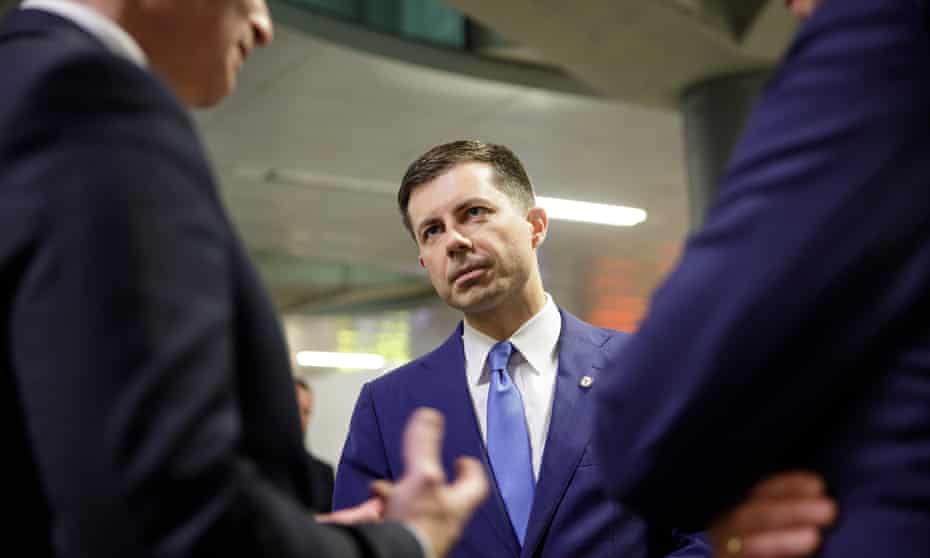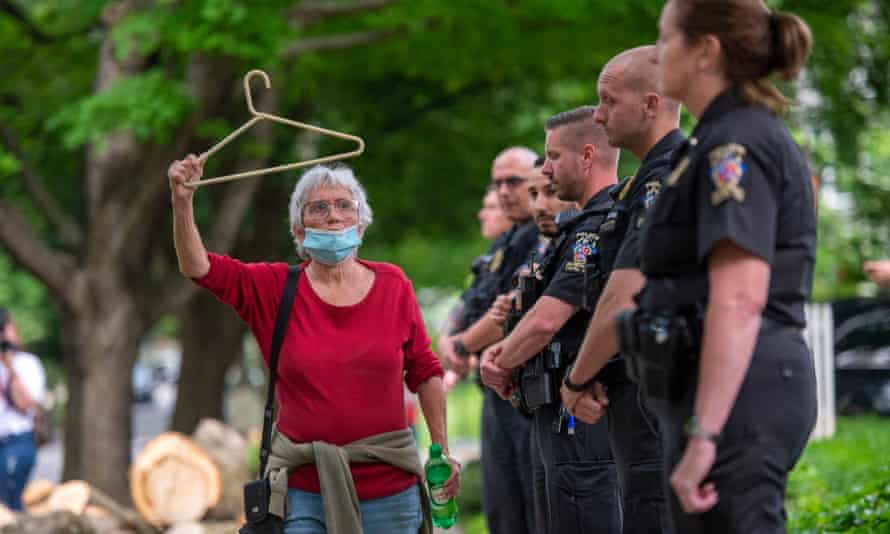US transportation secretary says supreme court’s ruling could determine future generations’ freedoms

Photograph: Christian Jungeblodt/The Guardian
Kate Connolly in Berlin
Kate Connolly in Berlin
Sat 21 May 2022
Pete Buttigieg, the US transportation secretary and the first openly gay member of a US administration, has expressed his worry that the expected overturning by the supreme court of the 1973 landmark decision which made abortion legal, may be the start of a s nis eries of eliminations of other groundbreaking rights and protections.
Pete Buttigieg, the US transportation secretary and the first openly gay member of a US administration, has expressed his worry that the expected overturning by the supreme court of the 1973 landmark decision which made abortion legal, may be the start of a s nis eries of eliminations of other groundbreaking rights and protections.
Earlier this month a leaked document showed that five conservatives on the nine-justice supreme court had voted to reverse their predecessors’ ruling in Roe v Wade nearly 50 years ago. The provisional ruling could lead to abortion being outlawed in more than half of US states unless it is changed substantially before becoming final.
Buttigieg said he was “very concerned” about the developments.
“It’s been 50 years since we first had this framework – my entire lifetime. So if something as essential as a woman’s right to decide about her healthcare is up for reversal, then any number of other rights and protections could be next,” he told the Guardian.
Buttigieg has been married since 2018, after coming out in 2015, the year same-sex marriage was first legalised in the US. He also served in the military under the ‘don’t ask, don’t tell’ policy.
He was mocked by some on the right last year when he took paternity leave after he and his husband became parents to twins.
“The fundamental question before us, is, did we who live in the 2020s live to see the high-water mark of rights and freedoms in this country, or will we in fact restore our pattern of each generation enjoying more and not less rights and freedoms than the last?’ he said.

A pro-choice campaigner protests outside the home of US Supreme Court Justice, Brett Kavanaugh.
Photograph: Bonnie Cash/Getty Images
“That question will be settled largely at the supreme court in this decade.”
Buttigieg has spoken out about the new Florida law which prohibits discussion of sexual orientation or gender identity in primary grade levels, dubbed by critics the ‘don’t say gay’ bill.
“Bottom line, it’s hurting kids,” he said. “I think about what life might be like for our kids when they start school. If they were in a place like Florida, it might stop them from mentioning they had a great time over the weekend with their dads.”
His husband, Chasten, said on Twitter it would “kill kids” and make the state “a harder place for LGBTQ kids to survive in”.
Ahead of his appointment as transportation secretary, Buttigieg recalled how as a 17-year-old in Indiana he had watched on television as President Clinton nominated James Hormel as US ambassador to Luxembourg in 1998, only for some Senate Republicans to unsuccessfully oppose his nomination because he was gay.
“I learned something about some of the limits that exist in this country when it comes to who is allowed to belong,” he said in a speech. “But just as important, I saw how those limits could be challenged.”
“That question will be settled largely at the supreme court in this decade.”
Buttigieg has spoken out about the new Florida law which prohibits discussion of sexual orientation or gender identity in primary grade levels, dubbed by critics the ‘don’t say gay’ bill.
“Bottom line, it’s hurting kids,” he said. “I think about what life might be like for our kids when they start school. If they were in a place like Florida, it might stop them from mentioning they had a great time over the weekend with their dads.”
His husband, Chasten, said on Twitter it would “kill kids” and make the state “a harder place for LGBTQ kids to survive in”.
Ahead of his appointment as transportation secretary, Buttigieg recalled how as a 17-year-old in Indiana he had watched on television as President Clinton nominated James Hormel as US ambassador to Luxembourg in 1998, only for some Senate Republicans to unsuccessfully oppose his nomination because he was gay.
“I learned something about some of the limits that exist in this country when it comes to who is allowed to belong,” he said in a speech. “But just as important, I saw how those limits could be challenged.”
No comments:
Post a Comment